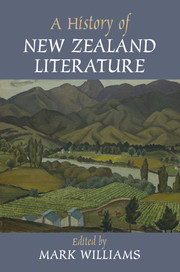Book contents
- Frontmatter
- Contents
- Notes on Contributors
- Acknowledgments
- Introduction
- PART I 1760–1920
- 1 A World of Waters: Imagining, Voyaging, Entanglement
- 2 Early Māori Literature: The Writing of Hakaraia Kiharoa
- 3 Samuel Butler's Influence
- 4 Maoriland Reservations
- 5 Katherine Mansfield: Colonial Modernist
- PART II 1920–1950
- PART III 1950–1972
- PART IV 1972–1990
- PART V 1990–2014
- Index
3 - Samuel Butler's Influence
from PART I - 1760–1920
Published online by Cambridge University Press: 05 April 2016
- Frontmatter
- Contents
- Notes on Contributors
- Acknowledgments
- Introduction
- PART I 1760–1920
- 1 A World of Waters: Imagining, Voyaging, Entanglement
- 2 Early Māori Literature: The Writing of Hakaraia Kiharoa
- 3 Samuel Butler's Influence
- 4 Maoriland Reservations
- 5 Katherine Mansfield: Colonial Modernist
- PART II 1920–1950
- PART III 1950–1972
- PART IV 1972–1990
- PART V 1990–2014
- Index
Summary
Who was Samuel Butler? He was born into a prominent Anglican family in 1835. His grandfather was a famous headmaster and bishop; his father a rich clergyman, and he himself, intended for the Church, was given a gentlemanly education first at public school and then at Cambridge. But after graduation his family's plans for him began to go awry. He worked in an East End parish, where it became clear that a career in the Church was impossible for him. And the alternative professions that his father proposed – the military, teaching, the law – were no more attractive, perhaps because they supported a social system he was beginning to question.
So in 1859 his family agreed to let him immigrate to Canterbury, New Zealand, providing him with the capital to set up as a farmer there. Canterbury was approved by Butler's family because it was a colonial project under Anglican sponsorship. It had been settled as recently as 1850 in the last of the enterprises organised on the basis of Edward Gibbon Wakefield's theory of systematic colonisation, but was managed by the Canterbury Association, which deployed Wakefield's theory on the Church's behalf. It was named after the Canterbury Pilgrims; the departure of the association's ships involved highly publicised religious rituals at Canterbury Cathedral; its governing board was dominated by Churchly Tories.
On the face of it, the Canterbury Association was an incoherent enterprise since Wakefield's systematic colonialism drew upon secular-utilitarian political and economic principles. His system's key mechanism was ‘sufficient price’ based on the notion that, if colonial land prices were set at an artificially high level, and protected both from market forces and the anarchy of individual purchases from Indigenous peoples, then land sale profits could be used to solve the endemic problem of colonial labour shortages so as to enable purified versions of British society, capable of self-government, around the globe. In effect, Wakefield's scheme used centralising policies associated with the Benthamite radicals to serve a post-Burkean conservative purpose, namely the reinvention of traditional estate-based rural community – all this based on a faith in the translocatability of British society.
- Type
- Chapter
- Information
- A History of New Zealand Literature , pp. 44 - 55Publisher: Cambridge University PressPrint publication year: 2016
- 2
- Cited by



